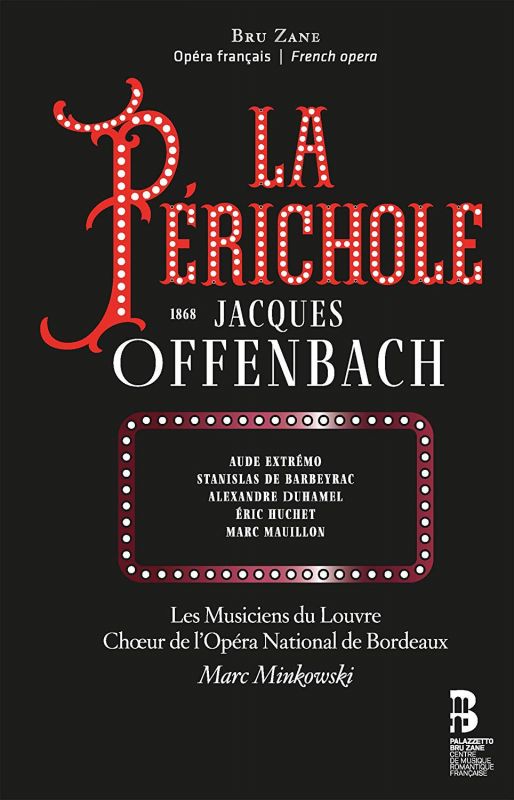OFFENBACH La Périchole (Minkowski)
View record and artist detailsRecord and Artist Details
Composer or Director: Jacques Offenbach
Genre:
Opera
Label: Bru Zane
Magazine Review Date: 10/2019
Media Format: CD or Download
Media Runtime: 103
Mastering:
DDD
Catalogue Number: BZ1036

Tracks:
| Composition | Artist Credit |
|---|---|
| (La) Périchole |
Jacques Offenbach, Composer
(Les) Musiciens du Louvre Adriana Bignagni Lesca, Brambilla, Mezzo soprano Alexandre Duhamel, Don Andres de Ribeira, Baritone Aude Extrémo, La Périchole, Mezzo soprano Bordeaux National Opera Chorus Enguerrand de Hys, First Lawyer; Marquis, Tenor Eric Huchet, Don Miguel de Panatellas, Tenor François Pardailhé, Second Lawyer, Tenor Jacques Offenbach, Composer Jean Sclavis, Prisoner, Tenor Julie Pasturaud, Berginella; Frasquinella, Mezzo soprano Marc Mauillon, Don Pedro de Hinoyosa, Tenor Marc Minkowski, Conductor Mélodie Ruvio, Mastrilla; Ninetta, Contralto Olivia Doray, Guadalena; Manuelita, Soprano Stanislas de Barbeyrac, Piquillo, Tenor |
Author: Richard Bratby
But what a delight it is to see a new operetta recording presented as handsomely as this! Like all of the Bru Zane opera series, it’s a thing of physical beauty: a hardback book containing several interesting and insightful essays as well as – happy day! – a complete libretto and translation. That’s particularly necessary, because for this live Opéra de Bordeaux performance, Marc Minkowski has conflated the 1868 and 1874 versions of the score into a personal edition that doesn’t quite correspond to any other recorded version. In the pit are Les Musiciens du Louvre – part of a growing and welcome trend towards giving operetta the benefits of historically informed practice.
You can hear the result from the very first bars: springy, lean, with the underlying dance rhythms (Minkowski favours brisk tempos) bouncing naturally up from the bass, and the woodwinds alternately flashing and tinting the music in watercolour shades. It’s not a luxurious sound, but it’s vivid and subtle and it conveys the vibrant immediacy of a piece of live theatre: for me, always a valid trade-off for an occasional ragged chorus and yards of spoken dialogue. You’ve got all the thumps, bangs and noises off that you’d expect in a live performance and you can feel the performers responding to the crowd. Alexandre Duhamel as Don Andrès practically bellows the walls down in the Act 3 dungeon scene, and even La Périchole herself – a usually dignified Aude Extrémo – can’t quite resist hamming it up in her famous (and uproarious) drunken aria, ‘Ah, quel diner’.
That aside, the principals are very much inside their parts. It’s not really comparing like with like to judge Extrémo’s sultry, wide-grained mezzo against the silken vocal allure of Teresa Berganza on the classic 1981 Plasson recording; but she has no trouble finding the requisite pathos in Périchole’s Act 1 Letter Song, and she’s matched in that regard by Stanislas de Barbeyrac’s Piquillo: more brazen and more blustery than Carreras on the Plasson set, it’s true, but at least he makes his inebriated cadenza sound like a joke, rather than Carréras’s piece of solfège. Duhamel’s cocoa-voiced teddy bear of a Don Andrès heads up a lively and idiomatic set of minor roles, and adds just enough menace to the general opéra-bouffe absurdity as the plot spins to its entertainingly improbable conclusion. It’s a real pleasure; and if world-class singing is not your first priority, this set can be recommended without hesitation.
Discover the world's largest classical music catalogue with Presto Music.

Gramophone Digital Club
- Digital Edition
- Digital Archive
- Reviews Database
- Full website access
From £8.75 / month
Subscribe
Gramophone Full Club
- Print Edition
- Digital Edition
- Digital Archive
- Reviews Database
- Full website access
From £11.00 / month
Subscribe
If you are a library, university or other organisation that would be interested in an institutional subscription to Gramophone please click here for further information.




